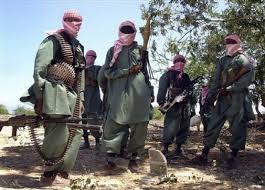
By Abdi Sheikh and Feisal Omar
MOGADISHU (Reuters) – Islamist militants have beheaded eight Somali village elders and killed at least seven other people during fighting spurred by a dispute over payment of an Islamic tax, a villager and a local official said on Wednesday.
Villagers in the semi-autonomous region of Galmadug in central Somalia also killed 10 militants during three days of fighting, the villager said, adding that Somali authorities had provided no help or support.
The Islamist insurgent group al Shabaab is battling a weak United Nations-backed government in Mogadishu in an effort to impose its strict interpretation of Islamic law in areas of the country it controls.
“Al Shabaab ordered us to pay dozens of animals for zakat (Islamic tax) and we rejected this – that is how the fighting started. We killed 10 militants on the first day,” local elder Nur Abdullahi told Reuters.
“So al Shabaab came from every region and fiercely attacked us in five villages. They beheaded eight elders and shot dead seven others on Monday and Tuesday.”
“They cut off the phones. We ran out of bullets, food and water. We have fled into the jungle and neither (forces from) Galmudug nor the federal government is helping us. They (the militants) took our borehole machine, a herd of camel and burnt two of our villages,” he said.
THOUSANDS FLEE
The insurgents could not be immediately reached for comment, but a local official largely confirmed Abdullahi’s account of the incident.
“The people are suffering from drought and rejected the zakat imposed by the militants. Some elders were beheaded,” Abdi Hussein Mohamed, deputy governor of the Mudug region in Galmudug, told Reuters on Wednesday.
“Shabaab also burnt two villages and thousands of families fled. The area is 300 kilometers away from us and we cannot help them because we are engaged in the election. The federal government has not saved the civilians.”
Government troops drawn from clan militias often go unpaid for months at a time and have little equipment or training. Many of them are used as bodyguards by candidates standing in the Horn of Africa nation’s complex elections.
In a process likely to last until mid-December, some 14,000 voters – in a country with an estimated population of about 10.5 million – representing Somalia’s federal states are choosing 275 lawmakers. The legislators will eventually pick a new president.
Al Shabaab has vowed to disrupt the elections, and the government and the United Nations say the threat of violence prevented a broader vote involving the whole population.
(Writing by Katharine Houreld; Editing by Gareth Jones)











